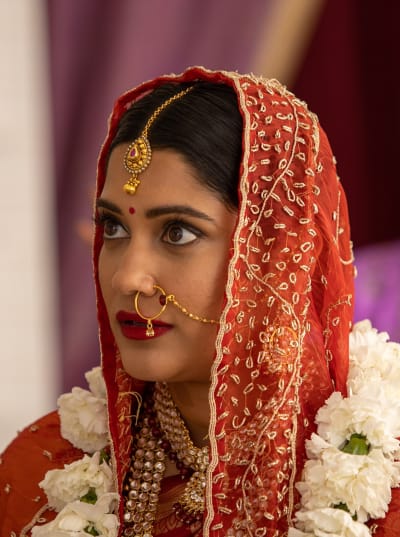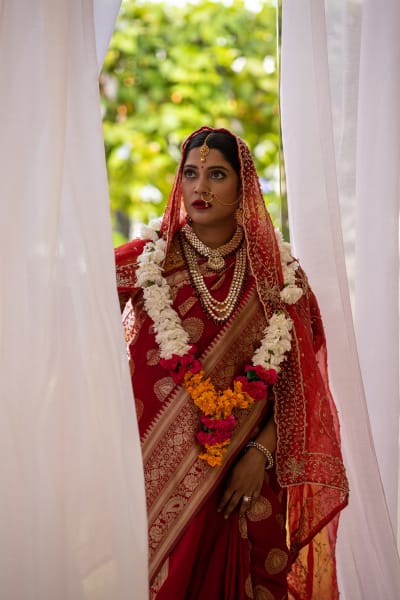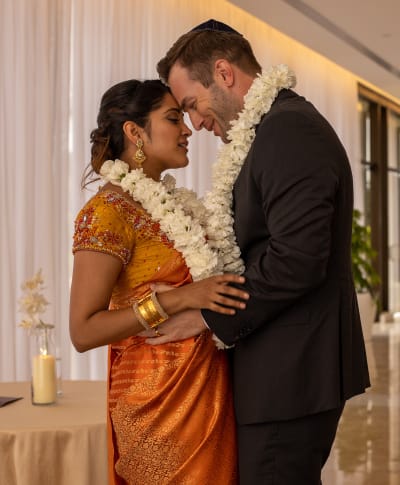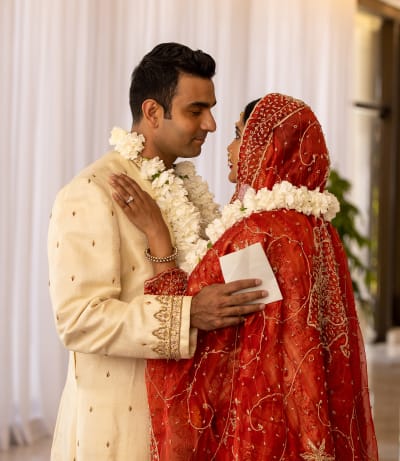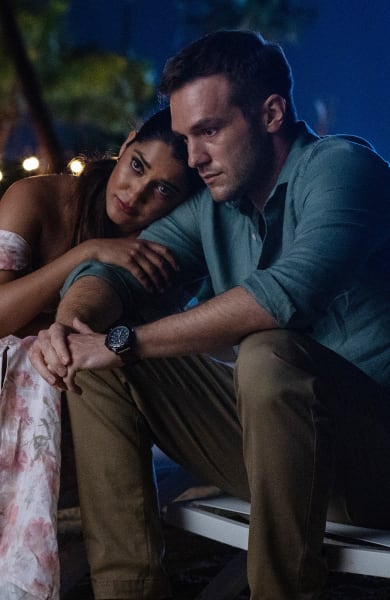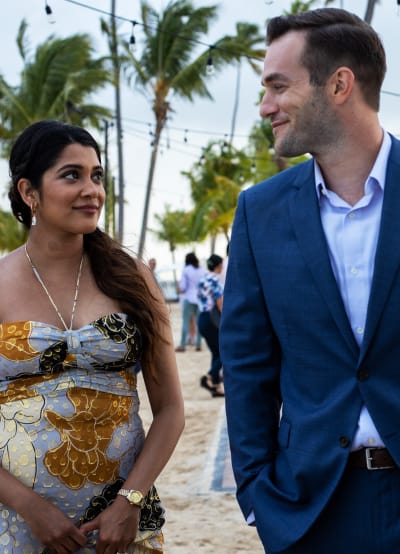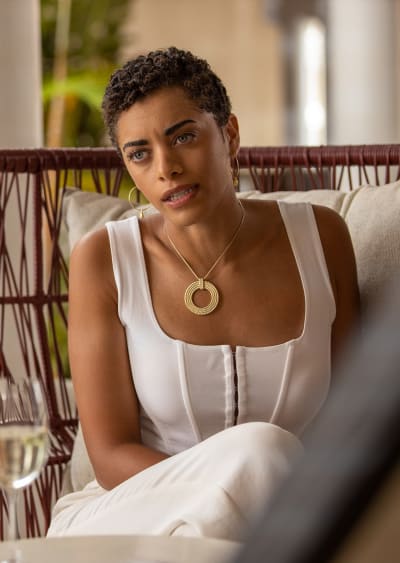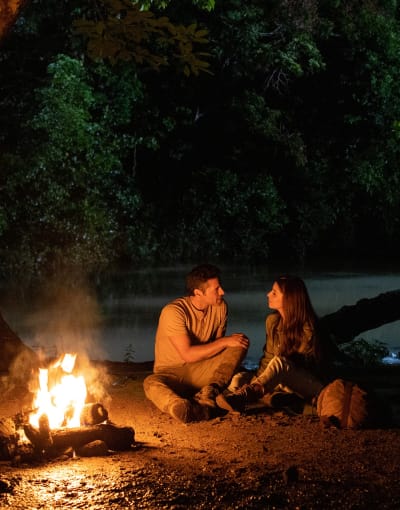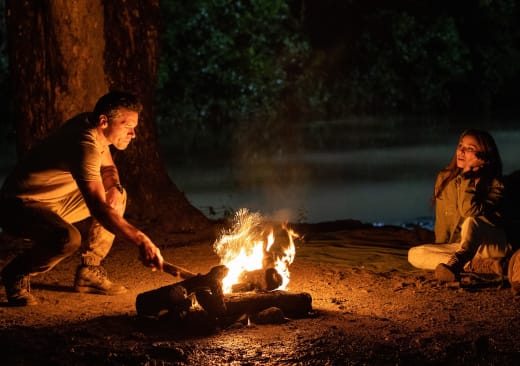In every fantastical plot concept, there comes a point when real life intrudes on one’s suspension of disbelief.
On Fantasy Island Season 1 Episode 5, the “Sliding Doors” take on life choices is a solid approach to someone obsessed with making the right decision for herself.
However, the basis of her dilemma — the need to fulfill her ridiculously time-sensitive life goals list — is a hard one to chalk up to anything but an excruciating level of privilege.
I’m not saying that Nisha didn’t work hard to achieve her goals to this point. She admits to being an intense individual with a singular vision of how her life will be. That determination has obviously been key to her success.
But it’s also clear that she’s never been faced with any sort of life challenge that has forced her to make a significant change to her life plan.
And that, in itself, is a privilege.
If I don’t get married, it means no kids by thirty, empty nest by fifty-two, and retirement by fifty-five. And if I don’t retire by fifty-five, I won’t have time to pursue my actual dream, opening a restaurant by sixty. I’m twenty-six and out of time.
Nisha
And to plan her life with the expectation that she will have the financial means, physical health, and mental wherewithal to start and run a restaurant at age SIXTY? That’s beyond optimistic. That is, truly, a fantasy.
But to speak to the fantasy she’s on the island to experience, I can’t help but feel it’s a waste of resources. But that might just be me being a tad bit judgy.
Her entire situation is predicated on the presumption that she must get married. And, again, that’s based on her laminated-in-stone life goals list.
And there’s another issue in the “married by 26, kids by 28” plan in light of her law career.
Establishing oneself as a lawyer takes more than a few years. The time and energy needed to raise a young family is a separate career in itself, even with the most accommodating of firms and most supportive of spouses.
I’ll admit the back and forth nature of the fantasy was engaging to watch. I’d expected a more linear comparison where Nisha would live an entire marriage to one man first and then live version 2.0 out in its entirety for contrast.
The fact that both Josh and Savin are good men and caring husbands would enhance the difficulty of Nisha’s choice IF she actually needed to choose.
Nisha: I didn’t ask to see this. I wanted to know about Josh and Savin, not about this.
Ruby: Well, hard times tell you who people really are.
That both marriages have their share of challenges is appreciated, as it adds depth to Nisha’s understanding of relationships.
However, more than the differences between Savin and Josh, I found the differences in Nisha herself more interesting.
With Savin, Nisha comes to the marriage with more openness and willingness to adjust to life with a man she is just getting to know.
Despite still holding to some immutable goals, she’s more flexible to meet her husband halfway to respect their shared and accepted cultural norms.
Nisha: Kids was always part of the plan.
Savin: Plans can change.
Nisha: That’s not who I am, Sav.
With Josh, perhaps because they have an established relationship and history, she is more set in her ways and seems to expect conflict. It is established right at the start that Josh is the partner ready to change his goals to preserve their life together.
I didn’t believe in marriage, and then I met the most complicated, challenging, hilarious, beautiful woman in the world. Then I did believe.
Josh
This pattern holds true throughout their marriage. Josh gives up his app development dream to support her life plan goals. He accepts her need to bring her mother into their home after her father dies despite personal misgivings about the living situation.
But Nisha is stressed, quietly (until she isn’t), resentful that she has to be the family breadwinner.
With Savin, she learns to be more flexible. When they are unable to conceive, she eventually comes around to adopting. When his career becomes more demanding, she gives up hers.
Their life is comfortable. Her life is secure. But still, she is unfulfilled.
In both situations, she isn’t honest or fair to her husband.
With Savin, she never shares her real dream of owning a restaurant.
With Josh, she never acknowledges his dreams, and, as we see when they meet again in the Savin timeline, he could’ve been a huge success if she’d been willing to support him even a little.
When she finally reaches her “I choose me” moment, it was incredibly anticlimactic. Because… duh. It always was about her and her dreams.
Did she really need the island to figure that out? Well, maybe.
Mukesh: Is it too fast? We can wait a little bit if you want.
Anu: She’s already twenty-six! You want her to get stuck with somebody divorced or unemployed?
I wonder if her list was the product of lessons from childhood and whether we are meant to infer through her mother’s less-than-modern comments that those expectations were internalized at a young age.
Nisha: Sorry, mom.
Anu: Don’t be sorry. I want grandchildren, just don’t make them in the hallway of the hotel, okay?
In that case, Ruby’s role in guiding her through the harder parts of her fantasy is one of being a maternal substitute.
It also gives her a chance to talk about Meredith, which feels important to the season’s long arc storyline.
As in Fantasy Island Season 1 Episode 4, we get one guest’s plotline and one staff member’s.
In this case, Javier gets a fantasy, and it’s all about Elena.
Again, duh.
So, the problem here is that the island’s fantasies usually play out like Star Trek’s holodeck, where the people filling out a guest’s fantasy are products, not real people.
What does it mean that Javier’s fantasy involves the very real Elena, not some facsimile?
The only thing that saves this whole scenario from feeling like a Westworld spinoff is that after Elena figures this all out, they have their sexy times in the hacienda.
I actually suspect that she only lets herself have that fling because it’s in the context of his fantasy, even if his fantasy was to spend some time with her.
After all, just because it’s his fantasy doesn’t mean she shouldn’t enjoy it too, right?
It does make things several degrees more complicated in their working relationship, and she knows it since she avoided taking Nisha to the plane at the end.
We’re left with a few lingering questions as Javier flies off. Will he pursue another tryst?
How will Meredith factor into Ruby’s new life?
Can Elena balance her responsibility to the island with her responsibility to herself?
As you watch Fantasy Island online, consider that the modernizing of the reboot has complicated things primarily based on the leads being female.
Is that a bias based on the stereotypical emotionality of women? Or is this the natural evolution of the “Roarke” character? Let us know your thoughts in the comments!
Diana Keng is a staff writer for TV Fanatic. Follow her on Twitter.

